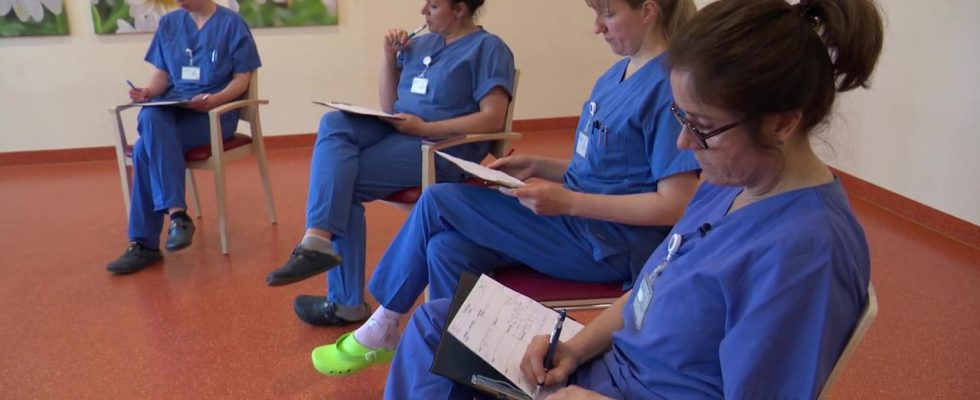in the middle
The birth of a child should be the most beautiful moment in life for parents. But sometimes it becomes a life-or-death struggle. Then you need experienced midwives. Just like Claudia Unruh.
The midwives in Hamburg Altona accompanied 3626 births last year. Claudia Unruh is one of them. Your shift in the midwife’s office begins at 8 a.m. with the handover. The location is quiet, the day promises to be relaxed. The 57-year-old still has no idea what kind of emergency she will face today.
Unruh’s shift is 12 hours straight. Unusually long for midwives, who usually work eight hours a day. This is often too short to accompany an entire birth. With its concept, the midwifery office wants to enable closer care. This also means that a midwife is only responsible for two women. This is significantly better than in many hospitals.
Pregnant women only get to know the midwife shortly before the birth
Nevertheless, the unrest is still not enough. You really need one midwife for every woman, she says. “The best thing of all is when you have the women in the care, doing the birth with them and the postpartum period,” she explains, shortly after giving birth to her first baby that day. A planned cesarean section. The young parents only met their midwife an hour earlier.
All-round care would be better, according to Unruh. The experienced midwife actually finds that the most beautiful thing about her job. However, for financial reasons and because she was no longer strong enough to be on call 24 hours a day, she gave up the close supervision. “Then you have to give it up at some point and go into shift work,” she says. In general, the situation of midwives in Germany hardly allows for support throughout the entire pregnancy.
There are around 26,000 midwives throughout Germany. About 10,000 of them are permanently employed in clinics. The rest work freelance or part-time, according to the German Association of Midwives with the latest figures from 2020. This is not enough to cover the need for support.
The need for midwives is great.
“Permanent stress and poor pay”
Poor supply infrastructure and difficulties in reconciling family and work are only part of the problem. “The work in the clinics is characterized by constant stress and poor pay,” explains Ulrike Geppert-Orthofer, President of the German Association of Midwives. “All in all, it is often not possible for the female colleagues to take care of women and children in the way they have learned and in line with professional ethics.”
According to Geppert-Orthofer, many midwives would therefore leave clinical obstetrics or even the entire profession. The president of the association demands that midwife-led obstetrics be anchored in basic care and offered directly where the families live. The midwives’ congress, which will take place in Berlin until tomorrow, should also draw attention to this.
Claudia Unruh is also familiar with these problems. In your opinion, the situation could be very different. “I’m sure that if the men would have the children, we would have had one-to-one care long ago,” she says during a short break in the midwife’s office.
Claudia Unruh, who has been giving birth to newborns for 30 years, is relaxed about the next delivery. “She had her first child within 40 minutes, I’m sure it will be relatively quick.”
Shortly thereafter her beeper rings. “The contractions have probably gotten stronger,” exclaims Claudia Unruh as she quickly walks into the expectant mother’s room. In front of the door it becomes clear: the birth is about to begin. The words of the midwife mingle with the cries of the woman giving birth. “Of course you can do it. You’re a grenade,” Unruh encourages her.
Suddenly hectic breaks out
The delivery is much harder than expected. The woman needs a break, Unruh needs an exchange with her colleagues. “She’s at a point where she doesn’t want to anymore. You just have to leave her alone for a moment.” If she were employed in a conventional clinic, she would now have finished work. An eight-hour day is over.
Instead, it goes back to the exhausted woman’s room – and suddenly hectic breaks out. Where the midwives otherwise radiate absolute calm, they now run down the hallway and rush to help Unruh. First two, then four, then six of them. In the end, it takes seven women to bring the baby into the world.
The child, Unruh recounts later, was already out with his head, but his shoulders were stuck. It couldn’t breathe anymore – danger to life. With combined forces, the midwives turned the child.
Life and death are close together
“The woman was so scared, it wasn’t so nice,” says Unruh afterwards. She is exhausted but happy. Life and death are very close together on these corridors. But that doesn’t bother her. “You must never lose respect for being responsible for two people,” she explains. “You just have to do it to the best of your knowledge and belief.”
In an hour, Unruh will have finished work and will hand over responsibility to her colleagues. But now she has to change her clothes. She is bathed in amniotic fluid.

